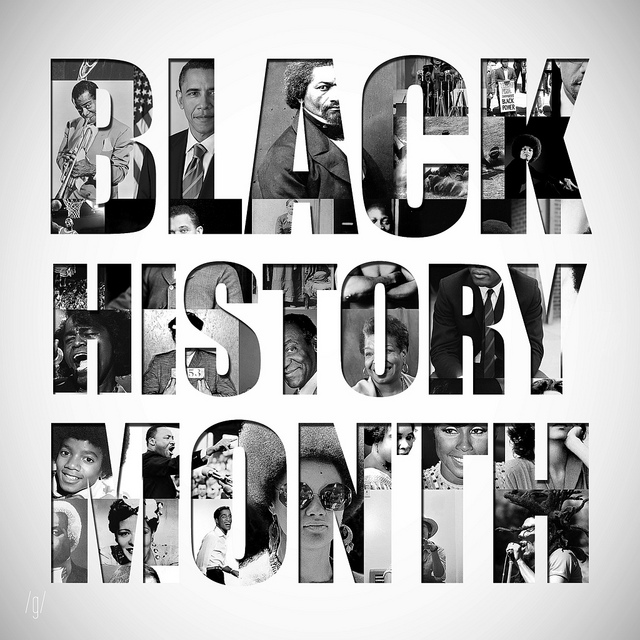Black History and the Conservative Roots of Race Analysis
New in Ceasefire, Politics - Posted on Sunday, October 16, 2011 15:05 - 9 Comments

October marks Black History month in Britain and manifests in our key institutions (schools, libraries, museums) as thirty-one days of PR for British colonialism and The Transatlantic Slave Trade. Twenty-four years since its beginnings in Britain we resurrect the annual debate over whether we still need it, but counter narratives – of which BHM is one – are an integral part of our anti-racism resistances. Our post-racial proclamations that argue for the redundancy of BHM are weakened by a reliance on popular memory, a lack of historical context beyond the past decade
and a serious misunderstanding of the process and formation of race in Britain. The dominance of African-American experience in popular discourse of race and resistance, and of South Asia in post- colonial narratives contributes to a popular knowledge vacuum amongst Black British communities, and importantly also amongst the majority white populous. There are important questions about the origins of race/racial discrimination, its persistent significance in our culture, and the nature of resistance in British society; to which I have chosen the difficult task of attempting to answer with reference to Kenan Malik’s The Meaning of Race.
Most often when we take a historical/political approach to race we engage with post-colonialism and its most respected theorists: Frantz Fanon, Edward Said, Gayatri Spivak etc. These mid twentieth century writers were engaging with race in its explosion, when it was a full grown monster molesting populations of Blacks and Asians across the colonies. However, race had it’s infancy before this and it is the eighteenth-century (broadly speaking) that provides the important context for the origins of race in British society.
The growing influence of science, the dawn of Capitalism, urbanization, The Industrial and French Revolutions, empire and exploration are all cultural markers of eighteenth-century. Europe was undergoing rapid social change and out of this came the Enlightenment period characterised by the inevitable sense of progress, the place of intellectual autonomy over religious authority – and perhaps most important to this article – the notions of equality. By our own standards enlightenment philosophies were progressive, but their key weakness was that equality was viewed as the ‘natural’ order of things and as such it was expected that society would create it’s own harmony on the basis of man’s mutual good will.
 There was a serious problem presented to enlightenment thinkers when social inequality (namely the presence of the working poor) appeared to annex expected progress. ‘How could society reconcile its belief in social progress with its desire for social stability and fear of social anarchy?’1 These contradictions were remedied or more accurately legitimised by the Romantics. Interestingly the central ideas of equality and utilitarianism in the enlightenment were conflicting with the values
There was a serious problem presented to enlightenment thinkers when social inequality (namely the presence of the working poor) appeared to annex expected progress. ‘How could society reconcile its belief in social progress with its desire for social stability and fear of social anarchy?’1 These contradictions were remedied or more accurately legitimised by the Romantics. Interestingly the central ideas of equality and utilitarianism in the enlightenment were conflicting with the values
of the Romantic movement whose canonical poets (Blake, Shelley, Wordsworth, Keats) have long evoked socialist ideals in the British imagination. As Kenan Malik writes:
This rebellious strand of Romantic thought tended to be anti-capitalist and supportive of the ‘common man’. It applauded the French revolution and in general supported radical movements against social injustice and hierarchical institutions. The brand of Utopian anti- capitalism represented by Blake, Rousseau and Shelley is in many ways better seen as a precursor to the nineteenth-century socialist tradition than as part of the Romantic reaction against Enlightenment. 2
Romanticism in its more conservative form shared the general scepticism toward social change in the forms of secularisation and urbanization as it’s more radical threads, but importantly saw returned social hierarchy and traditional authority as solutions. Where the enlightenment ideals of equality fell short, Romanticism argued that equality was an undesirable goal. Threats to the social order were explained with the ‘discourse of difference’ and it is here that the terminology of race
takes prominence in British society and filters into it’s politics. In the pre-enlightenment feudal society hierarchy had been long established and unaltered. The various processes of change in the eighteenth-century essentially ruptured these formerly static relationships. The distinctions came to
be determined as ‘race’, distinguishing between the ruling class and the ostracised working majority:
It has already been established that every social order is founded upon three original classes, each of which represents a racial variety: the nobility, a more or less accurate reflection of the conquering race; and the bourgeoisie composed of mixed stock coming close to the chief race; and the common people who live in servitude or at least in very depressed position. These last belong to a lower race which came about in the south through the miscegenation with the negroes and in the north with the Finns.3 (Count Gobineau)
In The Meaning of Race Malik makes a lot of the roots of race in what we would now understand as class distinctions. Emphasising that race as a European construction was an intra-culture discourse before it developed into the ‘othering’ processes we are familiar with through post-colonial theory. He discusses at length how Blacks and the working poor in Britain were referred to using the same terms and derogatory language. However, the gravity of Malik’s historical reconstruction (filling in the staggering gaps in popular social memory of British racial history), left him vulnerable to naivete around decisive racial prejudices. Class hierarchy (which crudely discriminated between different types of men) simply provided the infrastructure upon which the racist pursuits of Social- Darwinism and racial science were built, Blacks always at the bottom of that social order. Race was not housed within class discrimination but was built as a ghastly extension to it. Although
colour had not quite come to dominate racial categories at this point, by no means were Blacks equal in estimation to the white working poor: the transatlantic slave trade was at its height during the 18th century which is the context for the political agenda of phrenology and other types of pseudo-scientific racist research. Unfortunately, Malik’s attempts to link the origins of race to class discrimination has the affect of placating his readers. It’s as though his book argues“they didn’t
really mean it” or “they treated poor whites badly too”. I think this history is far more useful in corroborating some of what we know about resistance theory: the power of collective movements.
Taking the British Abolitionist movement as a case study, the distortion of social memory presents a story of vertical power relationships: oppressed helpless slaves and a benevolent white middle class moved to pity and efforts of emancipation; of these most notable William Wilberforce. The temptation is often to do away with abolition narratives altogether, but I am more inclined to respect the political strategies that helped to bring about legislative change, whilst inflexibly
acknowledging the widespread resistance of Black freemen, slaves, workers and allies without whom no end to slave trading in Britain would have come. In paralleling the exploitation of Blacks slaves with the poorly treated white workers, the Abolitionist movement found mass appeal. As Peter Fryer writes:
‘The shift in public opinion is shown, above all, by the support for abolitionism even in places that owed a large share of their prosperity to the slave trade […] When (Thomas) Hardy declared that liberty for blacks and liberty for whites were indivisible, he was expressing more than a theoretical understanding. The unity in struggle of black and white working people found practical expression on the streets of British provincial centres in the 1970s.’4
Black Britons not only participated in cross race socialist efforts for emancipation, they lead them. It is not peculiar that white socialists were largely unperturbed by this, before politicised racism insisted on various forms of segregation, ‘mid-Victorians simply treated each individual black according to their evaluation of his social standing.’5 It is understandable then that within the British context during this period Blacks and whites of the working class engaged socially and Blacks took full agency in activism. One example is William Davidson a revolutionary socialist who was born in Kingston Jamaica. His story illustrates how Black led socialist groups militarised and organised attacks against key political figures during abolitionist efforts in Britain. He lead one of the Spencean Groups; ‘in 1815 it was the only socialist organisation in the country, and for a long time it was the most serious, determined, and influential revolutionary trend in London.’6 Davidson
would later be hanged and beheaded for his activism. It was strategic violent offensive movements coupled with the debate and literature published by Robert Wedderburn for example, (another Jamaican leading a segment of The Spenceans) that would lead to mass demonstration. On one occasion ‘the signatures of 1,500,000 protesters [were] sent to parliament,7 an astonishing resistance
in Britain to the proposal to renew the rights of French slave merchants after Napoleon’s defeat. The collectivity of race and class has since continued for centuries as a resistance strategy.
This condensed history of the beginnings of race in British society is hopefully a strong case against the passivity of the post-racial movement. Though we have been happy enough to publicly discuss race as a social construct I am quite concerned that we stop short of a consideration of who went to work to build it (advocates of Social Darwinism, anthropologists, politically motivated scientists etc). Racial discrimination was deliberate. This complex history needs to be included in
our annual explorations of Black British experience. Black History month should not be comprised of tokenism or stand alone positive reinforcement, but a critical engagement with British social history, the Black experience as a barometer for how far we have crushed the heart of darkness: British conservatism.
Nichole Black is a writer and cultural critic. She is currently researching Black British resistance movements at The University of Leeds. She blogs at www.nicoleblack.com
1 Malik. Kenan.,The Meaning of Race, Macmillan Press / New York University Press (1996), p86
2 Malik, p74
3 Ibid, p83
4 Fryer. Peter, Staying Power, Pluto Press (2010), p210
9 Comments
rudy
Some nice knowledge here.
Though the conception of ‘race’ may have been renewed with modernity I would’ve liked to hear about people like Septimius Severus… Apparently the Romans were quite racist and yet they placed a black man in charge of a large part of their Empire, including the UK.
I think my take on BHM contrasts nicely to yours;
http://rudy2shoes.wordpress.com/2011/09/26/on-their-black-history-month/
Also the meaning of BHM changes from year to year and also from place to place…
Peace
adam
I think the construction of ‘race’ as we know it today was very different within the Roman Empire. Not being a member of the Roman Empire was viewed as being of a different race, making race far more fluid than its modern European construct. People across Africa, the Arab World, Europe and parts of Asia were judged as being of an inferior race by how much they had integrated into the Roman Empire itself. Hence, a man of African descent, if integrated enough into the Empire, could become an elite, occupying the same place in the Romans’ racial hierachy as someone of Arab or Europe decent.
This is of course very different to today, as people like Obama, for instance, are still victims of huge swaths of racist abuse, despite being very much integrated into the US and the norms of its Empire
K
Great article, the Romans may have been Rudy but I agree with Adam because outisde the empire they frowned upon, what is today known as the UK and its inhabitants. They still looted from knowledge centres on the continent though. They also execrised a greater level of pluralism (for the most part of their history..).
That brings onto one the most saddening parts of the month, the fact that we don’t explore the beautiful aspects of our indigenous culture prior the world’s worst global genocide.
“This complex history needs to be included in our annual explorations of Black British experience” Agreed but this is not the responsibility of the state in some respects. There are so many supplementary schools and after school clubs that teach children about our narrative in this country, from the ‘Sons of Africa’ to Mary Prince to William Davidson. African Caribbean people don’t value the accomplishments of those that have come prior. Why don’t we acknowledge the UK’s Black Panther Party? This is a great article, I hope it reaches masses as opposed to being confined within a circle of academics… I’mma facebook it
A most excellent and incisive critique of a debate whose points I am not near enough to know personally, but it shows that we are forced to answer on either side of the Atlantic the same questions of the study of our collective Black history although we are nearly 100 years out from the inception of our own. The questions only become more egregious and baseless with time; the tone more vitriolic in the era of Obama when post-racial critique has reached its peak. You have certainly sent me into an intellectual tailspin with the references to William Davidson and Robert Wedderburn for although I am plugged into the exchange of Caribbean radicalism which provided the momentum for much of our socialist expansion in the era of the New Negro Renaissance, parallel Black British currents have been harder to come by. I’m sure that my Goodreads fellows will love you for how much I was able to expand that section of my to-reads list. Now If only I could find the time to catalogue them. Write/Right On!
Jane Doe
Afrikan ancestored people seem to be more into the European construct of ‘race’ than are Europeans. It’s about culture, not race. Resist cultural imperialism. Celebrate your local unique cultural expressions, but clearly see the oneness of the Cultural Unity of the Global Afrikan community – Cultural retentions are everywhere.
Ellington Graves
Many thanks Nichole for a glimpse into the nuances of race in the UK. I would be interested to see your take on the first few chapters of Audrey Smedley’s Race in North America, which deal with the Anglo-Saxon roots of the American racial system. To Rudy, though Roman notions of difference have been translated as race, their understanding of the concept were fundamentally different than that which characterizes the modern concept. Race in the loose translation refers to discrete populations linked by ancestry, culture, and practice,whereas the modern concept refers to metapopulations lacking coherent commonalities on any of these bases. Roman references to race correspond much more readily to notions of nation or ethnicity in modernity than to the idea of race as we have come to know it.
[…] Photo Credits: https://ceasefiremagazine.co.uk/black-history-conservative-roots-race/ […]
Best articel, good


What a fantastic piece of indisputable contextualisation, thank you!